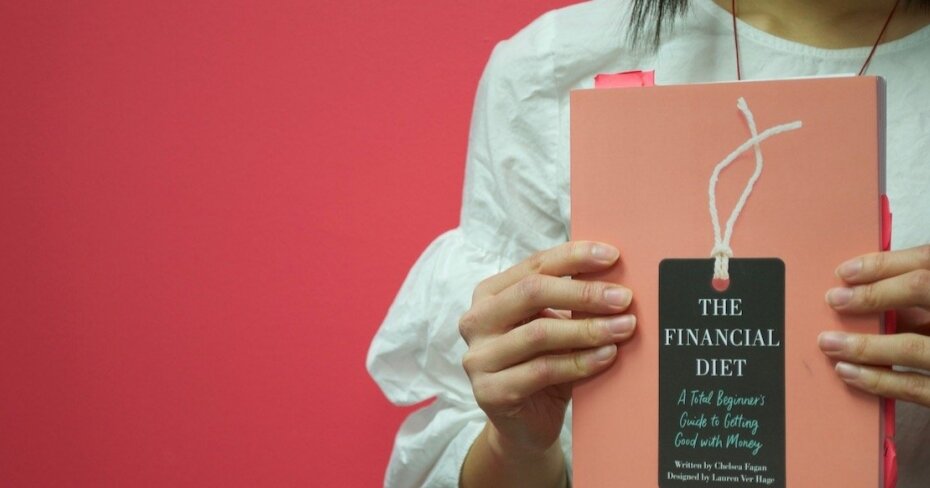Chelsea Fagan's new book gives an anxious generation the money advice it needs
By: Jessica Mach on January 8, 2018
Millennials don’t know how to do money; that’s what we keep hearing. The spending patterns that are associated with our cohort — living beyond our means, prioritizing short-term pleasures over long-term planning — are usually framed as proof that we’re irresponsible, or that we carry an inflated sense of entitlement to things we can’t afford. But, with little effort, you could also use those same statistics to tell a different story not entirely unrelated to the first. The aggressive aspirationalism might still be there, as would the reluctance to take the long view. But present, also, would be the deep-seated pessimism that drives those tendencies to begin with.
This second story — the one with the bad feelings — is the one that Chelsea Fagan runs with in her new self-help book The Financial Diet: A Total Beginner’s Guide to Getting Good with Money (Jan. 2, Holt Paperbacks). Based on the popular website of the same name that Fagan founded in 2014 with collaborator Lauren Ver Hage, The Financial Diet is a long-read take on the millennial-facing, personal finance and lifestyle content that its online counterpart serves in snack-sized blog posts. (A big chunk of the content on The Financial Diet, the website, is composed of listicles.) Both website and book are easy to digest and aspire to be relatable in the service of a bigger goal: to outline a clear path to financial health for a generation that often has trouble envisioning a future.
Money touches everything. It allows access to basic needs, like food, water, and shelter, as well as resources — higher education, unpaid or underpaid apprenticeships, social connections — that can equip you to meet the costs of being alive. How much money you have dictates whether you live in one place or another, and the types of relationships you can pursue and maintain. It determines whether you can live in safety, how long you’re likely to live at all, and, increasingly, whether the air you breathe is even clean.
Both website and book are easy to digest and aspire to be relatable in the service of a bigger goal: to outline a clear path to financial health for a generation that often has trouble envisioning a future
The all-encompassing role of money reverberates through The Financial Diet, though the stakes of the book are not always so high: its chapters cover relationships, food habits, and home maintenance and decorating in addition to advice on how to budget and invest. Despite its significance, though, money and the ways it weaves through our day-to-day lives — how much we spend, how much we make, how much we have, and where it all comes from — remains a perplexing subject for millennials to broach, both with each other and with ourselves.
This difficulty is not necessarily unique to millennials — older generations, for example, tend to have more qualms about discussing their salaries with friends, family members, and coworkers. But basic financial literacy among millennials, though steadily climbing (a 2015 study by the George Washington Global Financial Literacy Excellence Center reported that only 24% of surveyed millennials in the US carried basic financial knowledge, while a 2017 study saw the number rise to 57%), is still less pervasive than it is among other generations. If millennials, as studies and media outlets like to keep reciting, have been better educated than any other age cohort, why is this the case? Is it because nobody bothered to teach us about money, or because the rules that we had been taught no longer apply? Are we less proficient at grasping this particular kind of knowledge? Or is it simply that we don’t care?
Of course, all statistics point to the blunt conclusion that we should care, even more than our parents did. By now, the panoply of bad things that are chipping away at our financial health has received as much media air time — and registers with the same vacant frenzy — as your average bad pop song: crushing student debt; record-high rental rates; high unemployment rates relative to the rest of the working population; rising costs of living; the shift to precarious, contract-based work as the standard. If the most basic rule of responsible financial management is to not spend money on things you don’t need, it might be worth asking whether the average millennial can even find any fat to trim. But, given the poor prospects that many millennials face for reaching financial health in the near future — the average American student in the class of 2016 owes $37,172 USD in student debt — it makes sense that we’re hesitant to look at the numbers straight-on: what’s the point of sussing out the intricacies of what you already know to be fucking bleak?
Is it because nobody bothered to teach us about money, or because the rules that we had been taught no longer apply?
While I was going through The Financial Diet, I read another book that lent insight into the market for both Fagan’s book and her blog — which includes me (I’m 28). Malcolm Harris’ Kids These Days: Human Capital and the Making of Millennials (Nov. 7, 2017, Little, Brown, and Company) draws on a range of studies to counter depictions of the generic millennial as white (millennials in the US are, proportionally speaking, much more diverse than boomers), spoiled (they work harder for less), and reckless (they are more risk-averse). What Harris sees instead is a hyper-educated, over-supervised (and, in many racialized cases, over-policed) generation that has been primed from grade school onwards to compete for a part in a global workforce that doesn’t need — much less want — them all.
Faced with the reality of the market, the cohort became depressed (Harris notes that depression has increased by 1,000% in the past century, with about half of that growth occurring since the late 1980s) and even more competitive, leading to a strange reversal: practices that workers from previous generations had believed to be exploitative — like extreme flexibility in the workplace — became covetable, even necessary, skills. It’s the brand of logic that frames the business models of companies like Uber and Lyft as innovative, even though they’re literally based on breaking laws designed to protect the rights of cab drivers. In this milieu, the good of the collective — or even your own well-being — doesn’t matter as much as your competitive edge.
Read against Harris’ book, The Financial Diet moved me in a way that I did not expect, if only because what I expected was the individualistic, winner-take-all tone that Harris talks about, and that suffuses so much self-help media claiming to help millennials navigate today’s market. Beyond dispensing basic personal finance advice — don’t buy what you can’t afford, build an emergency savings fund, focus on debt reduction — what Fagan really advocates for is an attitude adjustment that gently counters what millennials have always been told about the world, and how to live within it.
Fagan’s ideal pace, in other words, is slower: allow yourself room to fail; be patient; and understand money as a means to a life — not just a thing to be accumulated
Fagan’s ideal pace, in other words, is slower: allow yourself room to fail; be patient; and understand money as a means to a life — not just a thing to be accumulated. “For many of us, the life we might imagine for ourselves is simply out of reach or leaves us with no clear road map to get there,” she writes. “Saving, living below your means, and diversifying your income often make the difference between being stuck in a job you can’t stand and having the freedom to move on to something better.”
Keep trying, says Fagan, but know that the risks are different for everyone, depending on when and where they come from; “lean in sometimes, but also lean the hell out other times, because you’re a human and humans should be defined by way more than their job title.” (It’s notable that even when Fagan uses terms created to fuel capitalist ambition — “agile,” formerly a Silicon Valley favourite, appears several times in the book — they are usually joined by a reminder to her readers to also just, relax.) The Financial Diet isn’t a guidebook on how to radically upend a bad system. But its advice is refreshingly scaled for humans — by which I mean that it puts people, not money, first.


